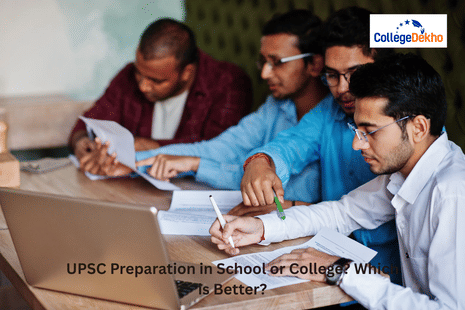College or school for UPSC preparation- you may be confused about this choice. While school gives an early start, college is where your understanding gets better. Let’s dive into the specifics of both to know which choice is better.

UPSC aspirants may worry about which time is perfect for them to start their preparations. Should they start at the base, which is school, or wait till they get to college? If we understand it correctly, both options have their pros and cons. That’s what we’ll be delving into with this article, so you can be better prepared and informed of your choice.
Also Check -
UPSC Mains Answer Writing Tips and Strategy 2026
UPSC Exam Preparation: What Does it Mean?
First, let us understand what preparation really covers. UPSC preparation entails building knowledge, skills, and habits that are a must for the UPSC Civil Services examination . The things you’ll be doing here include:
Reading NCERTs and the basics of History, Geography, Polity, and Economy
Keeping up with current affairs
Developing writing & analytical skills
Understanding exam pattern / previous year questions (PYQs)
(Later) choosing an optional subject, practising answer writing, mock tests
Starting UPSC Preparation in School: Pros & Cons to Consider
To cover the UPSC syllabus , many parents may push their students to start at the beginning, i.e., when they’re in school. But is it a wise choice? Let’s decode through this advantages and disadvantages table:
Advantages of UPSC Prep in School | Disadvantages of UPSC Prep in School |
|---|---|
|
|
Also Check - Can a BSc Chemistry Degree Help You Prepare for UPSC Exams?
Starting UPSC Preparation in College: Pros and Cons to Consider
When you choose to create a preparation calendar in college, you may enter with a more mature and disciplined mindset. However, the time lost may cause a little bit of panic.
Advantages of UPSC Prep in College | Disadvantages of UPSC Prep in College |
|---|---|
|
|
Factors to Consider for Your UPSC Preparation
We recommend you look at the following factors for informed decisions that are based on the discussion above related to college or school for your UPSC preparation:
Your learning style: Are you disciplined? Self-motivated? Able to study without an external structure? If yes, school prep can be very fruitful. If you need guidance, maybe lean more into UPSC prep once you're in college, and when more options are available to you.
Your academic burden & pressure: If your school demands too much or you're very involved in boards/extracurriculars, adding too much UPSC work early may exhaust you.
Your interest/clarity about UPSC: If you are sure you want to pursue UPSC, it makes sense that you start early. If not, test the waters. You can do so by reading current affairs, attempting PYQs, and trying basic topics before deeply committing.
Resources available: Coaching, mentors, peers, good study material, libraries, check all the resources you get in school vs college. In college, often better resources are accessible.
Academic stream/subject: If your major is one of the popular or overlapping ones (e.g., History, Polity, Geography, Economics, Sociology), starting early gives more overlap and advantage.
With all this discussion, one truth that comes to light is that you need to opt for a balanced approach. It means if you’re starting early in school, you should read basic NCERT books, cultivate the habit of reading newspapers, write short essays or answers on your favourite topics, and pursue leisurely activities and interests as well.
Then, in early college days, you need to deepen what you started by exploring previous year question papers. Look into optional subjects, attend seminars, try mock tests, and attend writing sessions.
In the final years of college, ramp up your preparation and intensify your study schedule. You should focus on the full UPSC syllabus, mock tests, revisions, decide on your optional subjects, and keep Plan Bs and Cs intact.
Concluding this topic, you must start early to cultivate your learning habit. Then, you need to make it intense when you reach college and can handle the stress with maturity and confidence. If this feels doubtful or you require experts to look into your situation, get in touch with CollegeDekho .
Are you feeling lost and unsure about what career path to take after completing 12th standard?
Say goodbye to confusion and hello to a bright future!


















Similar Articles
List of Colleges Affiliated to AKTU University
TN Post Office Recruitment 2026 Apply Online: Selection Process Explained
RRB Clerk Mains Cutoff 2025-26: Expected Category-Wise Marks
Raja Mahendra Pratap University Result 2026 Released: Direct Link
SSC MTS Exam City Intimation 2026 Released: How to Check
Rajju Bhaiya University Result 2025 Update: Revaluation and Next Steps